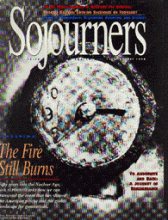I began this piece on the 50th anniversary of D-day-June 6, 1994. During the commemoration of the Allied invasion of Europe, I was moved by the remembrances of the soldiers and astonished by the magnitude of their undertaking and their loss.
Then as now, just days after the 50th anniversary of Hitler's surrender, I have conflicting emotions. One difficulty is this: Is affirming the courage and sacrifice of those who fought the same as affirming the war?
I understand, at least intellectually, that Jesus calls us to love our enemies and not kill them. I also feel strongly that it is neither appropriate nor loving to denigrate those who fought and died.
Remembering war is a slippery business, though. Words like valor and heroism are on my lips and at the tip of my pen. I don't ordinarily use those words. The emotion of what I see, hear, and read pulls me closer to the violence; it is a seductive tug and I can't readily identify what is happening, I only know that it is happening.
One never knows, but I can imagine that, had I been alive at the time, I would have rejoiced in the "liberation of Europe" and hailed the defeat of Nazi Germany. It is not difficult for me to imagine that I could justify violence in the face of Hitler. Yet I am aware that an important struggle is taking place within me during these days of reflection, and I know that the stakes are high.
IN THE MIDST of the journey from D-Day to V-E Day, I have been thinking about a visit I made to Dachau, a German death camp located just outside of Munich. I was 20 years old at the time, not so many years ago.
Read the Full Article
